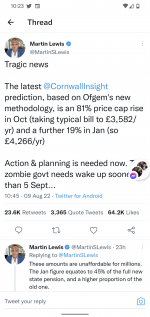We aren't 'maxed out' on wind production, by building more farms we can spread out across more varied areas in the UK and get better coverage. The south coast, for example, barely has any onshore wind farms, and it is currently windier there. But volatility is obviously a massive issue of course, I completely accept that. But we haven't mentioned solar yet, which tends to rise as wind declines, as we are obviously in the summer. 23% of our energy today (live) is coming from solar. 10% from wind. So our renewable power hasn't declined, that's in line with the yearly average (just solar and wind have swapped places). We should have more tidal power, which the UK is uniquely suited for, but is largely ignored. We should have more nuclear. These are failures.
The issue I have here is trying to blame 'net zero' and advocating for a return to the absolutely distrous use of coal. Coal decline in the UK was already well underway before climate change was even widely accepted, and decades before net zero was a thing. Natural gas was cheaper, and its rise in the 90s is directly correlated to steep declines in coal. It's not renewables that cannabalized the coal market, it was gas. Granted, the complete closure of coal since 2015 has been accelerated by government policy in aid of net zero, but this was really the last few percent of an already dying industry.

